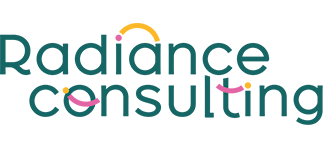Workplace Wellbeing
Evidence-based strategies, without the waffle.
Do you want to be seen as a caring employer who is taking steps to support, improve and enhance workplace well-being, making your company a better place to work?
Your team members are getting bored and frustrated with those generic EAP programmes and the lack of a personal touch to workplace wellbeing, and you know it.
You can help employees with the things that are adversely affecting their wellness, whether that’s in the workplace or outside it, by giving them access to an expert that can help them with personal circumstances that may be negatively impacting their performance and productivity.
It’s time to Lead the way in becoming a better place to work, Succeed in creating happier, more engaged employees, and Surpass the Expectations of your teams when it comes to workplace wellbeing!
Download the Radiance Workplace Wellbeing brochure now!
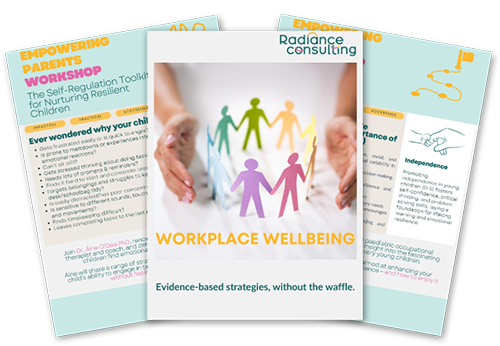
Radiance Workplace Wellbeing events focus on 3 main Pillars of Empowerment:
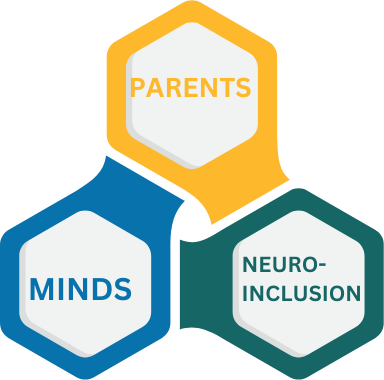
And all events focus on being:
IMPACTFUL
PRACTICAL
ACCESSIBLE
Did you know?
Under the WORK AND ACCESS – DISABILITY EQUALITY AND INCLUSION TRAINING GRANT, training & development programmes for Neurodiversity awareness and Neuroinclusive practices are eligible for government funding of up to
€20,000
The grant is available to any organisation with paid employees in the private, community & voluntary, or not-for-profit sectors.
Below is a flavour of some of the topics covered by Radiance Workplace Wellbeing events, but I’d be delighted to discuss these, or any other topics you’re thinking of, in detail with you!
EMPOWERING PARENTS WORKSHOP
Navigating the Wonder Years
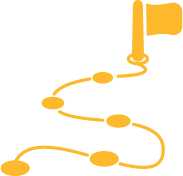
Understanding Child Development, the notable Milestones, and the importance of Independence (Ages 0 – 5)
- Understand the typical physical, cognitive, social, and emotional milestones and the range of normal variability in achieving them
- Practical strategies for encouraging self-care, decision-making, and play-based learning
- The role of independence in building confidence and autonomy in young children
- Sensory Processing and Its Impact on Development
- Techniques to support children with different sensory needs
- Creating a nurturing and safe environment that encourages exploration and independence
- Involving parents and caregivers in understanding and supporting developmental needs
Join Dr. Áine O’Dea PhD, renowned paediatric occupational therapist and coach, and gain expert insight into the fascinating brain development going on in very young children.
Áine will share a range of strategies aimed at enhancing your ability to promote your child’s independence – and how to enjoy it to the fullest!
Independence
Promoting independence in young children (0-5) fosters self-confidence, critical thinking, and problem-solving skills, laying a foundation for lifelong learning and emotional resilience.
EMPOWERING PARENTS WORKSHOP
Effective Organisation Strategies for Home
and School Life

For Stress Reduction at Home
This event is tailored to help you recognise the key stages of brain development for the child and adolescent and guide you towards a calmer and happier life. During this session you will learn to:
- Understand how different brain developmental stages influence a child’s/teen’s ability to learn and master everyday tasks independently.
- Recognise your child’s areas of strength and help them to build on these through simple daily activities
- Examine ways to name and explain why organisational skills can be tricky, and avoid emotional labels like “unmotivated”
- Identify different strategies that can help your child or teen to be more independent. more organised and less stress at home and in the school environment
Join Dr. Áine O’Dea PhD as she delves into the intricacies of the developing brain and how this influences children and adolescents’ ability to complete activities independently and manage stress.
Áine will share a range of strategies aimed at enhancing the family dynamic at home – and reducing stress for everyone!
The Child and Teen Brain
is still under construction. Adolescence is a critical period of brain development that can be misunderstood. Whilst early childhood development is critical, there are many other time points during the school years that are equally important.
EMPOWERING PARENTS WORKSHOP
The Self-Regulation Toolkit for Nurturing Resilient Children

Ever wondered why your child;
- Gets frustrated easily or is quick to anger?
- Is prone to meltdowns or experiences intense emotional reactions?
- Can’t sit still?
- Gets stressed thinking about doing tasks?
- Needs lots of prompts & reminders?
- Finds it hard to start and complete tasks?
- Forgets belongings and struggles to keep desk/schoolbag tidy?
- Is easily distracted/has poor concentration?
- Is sensitive to different sounds, touch, smells and movements?
- Finds timekeeping difficult?
- Leaves completing tasks to the last minute?
Join Dr. Áine O’Dea PhD, renowned paediatric occupational therapist and coach, and delve into the reasons why many children find emotional regulation challenging.
Áine will share a range of strategies aimed at enhancing your child’s ability to engage in tasks and experience emotions – without feeling overwhelmed!
Self-regulation
is the cornerstone of our ability to engage in everyday activities in a calm and organised manner. Find out simple and effective ways to support you and your child to manage everyday life situations with greater ease.
Are you “Smart but Scattered”?
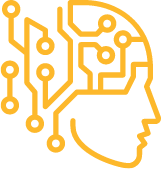
Completing tasks is just a part of life, both at home and at work, but getting things done can be more difficult for some of us than others.
Executive Functioning is often used as an umbrella term to refer to a set of neurocognitive processes, including working memory, inhibitory control, and cognitive flexibility. In this session you will get the opportunity to:
- Explore your individual executive functioning profile
- Identify patterns that impact your organisational and time management skills
- Learn strategies to support you to get things done at work and at home
- Identify ways to reduce the overwhelm and stress related to organisational skill challenges
Join Dr. Áine O’Dea PhD, renowned occupational therapist and NeuroLeadership Coach, and gain expert insight into the workings of your brain when it comes to planning, organising and executing tasks – at work and at home.
Áine will share a range of strategies aimed at enhancing your ability to perform – based on what works for YOUR brain!
Executive Functioning Skills
have nothing to do with how talented a CEO is, reading a P&L sheet, or managing a massive budget, and everything to do with how our brains function when it comes to preparing, planning and executing tasks, setting goals, and collaborating with others to achieve them.
Mastering the Art of Listening & Giving/Taking Feedback

Enhance Your Customer (and Colleague) Communication
Key highlights of this session include:
- Understanding Active Listening: Learn the nuances of active listening and discover why it’s a cornerstone of successful customer interactions
- Empathy in Communication: Explore techniques to foster genuine empathy, allowing you to connect with customers on a deeper level
- Barriers to Effective Listening: Identify common listening obstacles and learn strategies to overcome them, ensuring clearer and more effective communication
- Practical Listening Techniques: Gain insights into practical listening skills, including body language interpretation, verbal affirmations, and strategic question-asking, all tailored for customer engagement
- Feedback and Improvement: Learn how to effectively receive and integrate feedback for continuous improvement in listening and communication skills
Join Dr. Áine O’Dea PhD for the ideal event for customer service representatives, sales professionals, support agents, and anyone looking to elevate their communication skills under the guidance of an experienced occupational therapist and coach.
Áine will share strategies to unlock the secret to great communication skills – the superpower of empathy!
The #1 complaint from buyers
surveyed after engaging with solution providers is “I didn’t feel listened to / I didn’t feel like my problem was understood”
From Work-Life Balance, to Work-Life Harmony

Protecting Health and Enhancing Productivity through Work-Life Harmony
Key learning outcomes of this session include:
- The Science of Stress: Understand how psychological stress impacts the immune system and overall health, and explore the difference between acute and chronic stress and their implications for employee well-being
- The Business Case for Work-Life Harmony: Discover why integrating work-life harmony into your organisational strategy is essential for productivity, employee retention, and inclusivity.
- New Opportunities: Learn about the benefits of flexible work arrangements, including hybrid models, compressed workweeks, and job-sharing, and how they contribute to work-life harmony.
- Challenges and Solutions in Implementing Work-Life Harmony: Identify common challenges, such as blurred boundaries, burnout, equitable access to flexibility, and technological dependence.
- Practical Strategies for Leaders: Gain tools and techniques to promote a culture of work-life harmony within your organisation. Learn how to set clear boundaries, encourage regular breaks, and promote digital well-being to maintain a healthy separation between work and personal life.
Join Dr. Áine O’Dea PhD, an expert on the science of stress, its effects on the immune system, and how to manage it to improve individual and organisational health.
Áine will share strategies for overcoming challenges, including clear communication, tailored approaches, and strong leadership support.
Beyond the Balancing Act
In today’s fast-paced and demanding work environment, the pressure to perform can often lead to chronic stress, significantly impacting individual health and organisational success. In a post-COVID-19 era, new challenges and opportunities have arisen, and the need to redefine work-life balance as work-life harmony has never been more critical.
Neurodiversity 101

The basics of Neurodiversity awareness
- Introduction to Neurodiversity
- Understanding Specific Neurodivergent Conditions
- Understanding brain differences within the paradigm of neurodiversity
- Self-regulation for all, “from the buggy to the boardroom”
- Executive functioning skills – knowing our strengths and challenges
- Sensory processing
- Promoting Neurodiversity Awareness and Sensitivity among teams
- The Neurodiversity Paradigm in the Workplace
- Benefits of Neurodiversity in Professional Settings
- Unique Strengths and Talents of Neurodiverse Individuals
- Challenges Faced by Neurodivergent Employees
- Neurodiversity as a Competitive Advantage
Join Dr. Áine O’Dea PhD, Neurodiversity and Neuroinclusion expert, for this indispensable session that will lay the groundwork for inclusivity in your organisation.
Whether you’re looking for a place to start, or a chance to redefine your Diversity, Equality & Inclusion strategy – this is the event for you!
The 1st step to inclusivity is knowledge
Neuroinclusion is the practice of creating environments where neurodivergent individuals are valued, supported, and fully integrated. It fosters innovation, enhances problem-solving, and increases employee engagement by leveraging diverse perspectives, ultimately leading to stronger team performance and a competitive edge.
Understanding our Sensory Preferences at Home and at Work
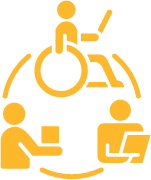
Enhancing Comfort and Productivity in Every Space
Key highlights of this session include:
- Identifying Sensory Preferences: Learn how to recognize and understand your unique sensory preferences and those of your family or co-workers
- Creating Sensory-Friendly Environments: Practical tips for adapting home and work spaces to better suit individual sensory needs
- Managing Sensory Overload: Strategies for effectively managing and reducing sensory overload in various environments
- Boosting Productivity and Well-being: Techniques for using sensory preferences to enhance focus, productivity, and overall well-being
- Fostering Inclusive Spaces: Insights into creating inclusive and supportive environments that cater to diverse sensory needs
Join Dr. Áine O’Dea PhD, a vastly experienced occupational therapist who has been conducting environmental and sensory preference assessments over 20 years for this insightful session.
Áine will enhance your understanding of how and why sensory preferences are so important – and different for everyone!
Sensory Preferences
can be Physical, Digital or Cultural – and all of them play a part in truly supporting diversity & inclusion at work and at home
The Neurodiversity Opportunity

Learn how to develop, nurture and cultivate the potential in your neurodivergent team members
Neuroinclusive practices can attract top talent from a wider pool, including highly skilled neurodivergent individuals. There are distinct advantages for companies who embrace inclusive practices in areas such as higher employee satisfaction, lower staff turnover, and enhanced public profile.
This session will guide you through:
- Understanding Neurodiversity and its Impact on the Workplace
- Strategies for Developing and Nurturing Neurodivergent Talent
- Creating a Culture of Inclusion and Belonging
- The Advantages in Talent Attraction and Retention
- Measuring Success and Continuous Improvement
Join Dr. Áine O’Dea PhD, Neurodiversity and Neuroinclusion expert, for this indispensable session, not just for HR & People leaders, but all leaders and people managers in your organisation.
Áine will share strategies to build a truly neuroinclusive workplace– and enhance the work experience for neurotypical and neurodivergent alike!
Being an effective leader
for your neurodivergent team members is a proven and distinct advantage in attracting & retaining talent.
